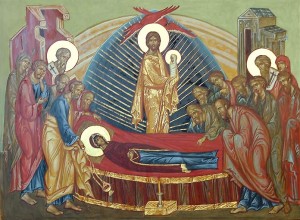
Click for my reflection on Mary’s feast day.
The origin of the feast day of the Blessed Virgin Mary on August 15 is unknown. It is possibly the date of the dedication of some church in her name.
Some quotes worthy of reflection from Mary: Grace and Hope in Christ – joint statement of the Anglican – Roman Catholic International Commission (ARCIC):
The dogmas of the Immaculate Conception and the Assumption raise a special problem for those Anglicans who do not consider that the precise definitions given by these dogmas are sufficiently supported by Scripture….
In the East the feast was known as the ‘dormition’, which implied her death but did not exclude her being taken into heaven. In the West the term used was ‘assumption’,which emphasized her being taken into heaven but did not exclude the possibility of her dying….
One consequence of our separation has been a tendency for Anglicans and Roman Catholics alike to exaggerate the importance of the Marian dogmas in themselves at the expense of the other truths more closely related to the foundation of the Christian faith. Anglicans and Roman Catholics agree that the doctrines of the Assumption and the Immaculate Conception of Mary must be understood in the light of the more central truth of her identity as Theotókos, which itself depends on faith in the Incarnation. We recognize that, following the Second Vatican Council and the teaching of recent Popes, the Christological and ecclesiological context for the Church’s doctrine concerning Mary is being re-received within the Roman Catholic Church. We now suggest that the adoption of an eschatological perspective may deepen our shared understanding of the place of Mary in the economy of grace, and the tradition of the Church concerning Mary which both our communions receive. Our hope is that the Roman Catholic Church and the Anglican Communion will recognize a common faith in the agreement concerning Mary which we here offer. Such a re-reception would mean the Marian teaching and devotion within our respective communities, including differences of emphasis, would be seen to be authentic expressions of Christian belief….
As a result of our study, the Commission offers the following agreements, which we believe significantly advance our consensus regarding Mary. We affirm together
– the teaching that God has taken the Blessed Virgin Mary in the fullness of her person into his glory as consonant with Scripture, and only to be understood in the light of Scripture (paragraph 58);
– that in view of her vocation to be the mother of the Holy One, Christ’s redeeming work reached ‘back’ in Mary to the depths of her being and to her earliest beginnings (paragraph 59);
– that the teaching about Mary in the two definitions of the Assumption and the Immaculate Conception, understood within the biblical pattern of the economy of hope and grace, can be said to be consonant with the teaching of the Scriptures and the ancient common traditions (paragraph 60);
– that this agreement, when accepted by our two Communions, would place the questions about authority which arise from the two definitions of 1854 and 1950 in a new ecumenical context (paragraphs 61-63);
– that Mary has a continuing ministry which serves the ministry of Christ, our unique mediator, that Mary and the saints pray for the whole Church and that the practice of asking Mary and the saints to pray for us is not communion-dividing.
Almighty God,
who looked upon the lowliness of the Blessed Virgin Mary
and chose her to be the mother of your only Son:
grant that we who are redeemed by his blood
may share with her in the glory of your eternal kingdom;
through Jesus Christ your Son our Lord,
who is alive and reigns with you,
in the unity of the Holy Spirit,
one God, now and for ever.
Amen.




Apparently the 15 August date was chosen because it was the Ferragosto festival in Italy – a festival in honour of the goddess Diana (Christians have been rather good at putting their festivals on old pagan ones!); apparently there are still fireworks and so on in Italy to this very day!
Thanks Blessed Mother for you gift of Love and encouragement to all your children!!!